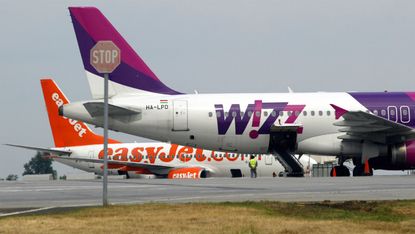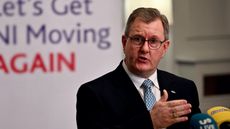Brexit: could your holiday be cancelled?
Aviation watchdog criticises airlines for keeping quiet about no-deal threat to thousands of flights

The trade association for the world’s airlines has called on carriers to warn passengers about how a no-deal Brexit could adversely affect their travel plans, amid fears that up to five million tickets between the UK and EU could be cancelled.
The International Air Transport Association (IATA) says that under EU legislation that will apply to Britain from 29 March if the nation quits the bloc without an agreement, flight numbers will be capped at last year’s levels. That means carriers including British Airways, easyJet, Ryanair and Jet2 would be forced to abandon new routes and flights being planned to meet increased demand, The Times reports.
And that threat appears to be growing, with a no-deal Brexit looking more likely following the defeat of Prime Minister Theresa May’s Brexit deal in the House of Commons last week.
Subscribe to The Week
Escape your echo chamber. Get the facts behind the news, plus analysis from multiple perspectives.

Sign up for The Week's Free Newsletters
From our morning news briefing to a weekly Good News Newsletter, get the best of The Week delivered directly to your inbox.
From our morning news briefing to a weekly Good News Newsletter, get the best of The Week delivered directly to your inbox.
Although the cost of cancelled tickets would be refunded to passengers, “they would then need to compete for scarce seats and could face higher fares”, notes The Independent.
In December, airports body ACI Europe calculated that the proposed cap on UK airline services “would ultimately result in the loss of 93,000 new flights and nearly 20 million airport passengers on the UK-EU27 market”.
Meanwhile, the IATA has warned that in a no-deal Brexit scenario, British travellers would be required to have at least six months left on their passports in order to visit EU countries.
Yet as of this week, only Hungarian budget carrier Wizz Air has warned British travellers of the no-deal rules.
On 16 January, the airline tweeted: “FOR UK PASSPORT HOLDERS ONLY. We want you to have a smooth journey, so please check if your UK passport is still valid for Europe after 29 March 2019. Further information related to other nationality passports is not yet available.”
Last week, the Department for Transport (DfT) advised expats living in the EU that their UK driving licences may no longer be valid in the case of a no-deal Brexit.
Current flight delay compensation laws, which are controlled by the EU, might also be nullified. The blue European Health Insurance (Ehic) card, which covers the cost of European travellers receiving treatment while in other EU countries, would no longer be available to UK citizens either.
IATA director-general Alexandre de Juniac has described the proposed cap on flights as a “huge step backwards for all European consumers”.
“In the small window remaining before Brexit, it is imperative that the EU and UK prioritise finding a solution that brings certainty to airlines planning growth to meet demand and to travellers planning business trips and family holidays,” he added.
Rory Boland, editor of Which? Travel, called the lack of warning for passengers “alarming”, adding: “It is the job of airlines to tell passengers what is likely to happen. If they were more upfront, it would give passengers the information they need to protect themselves.”
Create an account with the same email registered to your subscription to unlock access.
Sign up for Today's Best Articles in your inbox
A free daily email with the biggest news stories of the day – and the best features from TheWeek.com
-
 Bird flu worries mount as virus found in milk, cows
Bird flu worries mount as virus found in milk, cowsSpeed Read The FDA found traces of the virus in pasteurized grocery store milk
By Peter Weber, The Week US Published
-
 Palazzo Durazzo Suites in Genoa: a palatial gem in northern Italy
Palazzo Durazzo Suites in Genoa: a palatial gem in northern ItalyThe Week Recommends Live your Italian dream in this astonishing and recently restored palace in the heart of the city
By Nick Hendry Published
-
 Today's political cartoons - April 25, 2024
Today's political cartoons - April 25, 2024Cartoons Thursday's cartoons - TikTok in the firing line, protests on campus, and more
By The Week US Published
-
 Will Aukus pact survive a second Trump presidency?
Will Aukus pact survive a second Trump presidency?Today's Big Question US, UK and Australia seek to expand 'game-changer' defence partnership ahead of Republican's possible return to White House
By Sorcha Bradley, The Week UK Published
-
 It's the economy, Sunak: has 'Rishession' halted Tory fightback?
It's the economy, Sunak: has 'Rishession' halted Tory fightback?Today's Big Question PM's pledge to deliver economic growth is 'in tatters' as stagnation and falling living standards threaten Tory election wipeout
By Harriet Marsden, The Week UK Published
-
 Stormont power-sharing in sight: 'good news' for Northern Ireland?
Stormont power-sharing in sight: 'good news' for Northern Ireland?Talking Point Unionists vote to end two-year boycott after agreeing legislative package to address post-Brexit trading arrangements
By The Week UK Published
-
 Why your local council may be going bust
Why your local council may be going bustThe Explainer Across England, local councils are suffering from grave financial problems
By The Week UK Published
-
 Rishi Sunak and the right-wing press: heading for divorce?
Rishi Sunak and the right-wing press: heading for divorce?Talking Point The Telegraph launches 'assault' on PM just as many Tory MPs are contemplating losing their seats
By Keumars Afifi-Sabet, The Week UK Published
-
 How would a second Trump presidency affect Britain?
How would a second Trump presidency affect Britain?Today's Big Question Re-election of Republican frontrunner could threaten UK security, warns former head of secret service
By Harriet Marsden, The Week UK Published
-
 'Rwanda plan is less a deterrent and more a bluff'
'Rwanda plan is less a deterrent and more a bluff'Instant Opinion Opinion, comment and editorials of the day
By The Week UK Published
-
 How the biggest election year in history might play out
How the biggest election year in history might play outThe Explainer Votes in world's biggest democracies, as well as its most 'despotic' and 'stressed' countries, face threats of violence and suppression
By Harriet Marsden, The Week UK Published